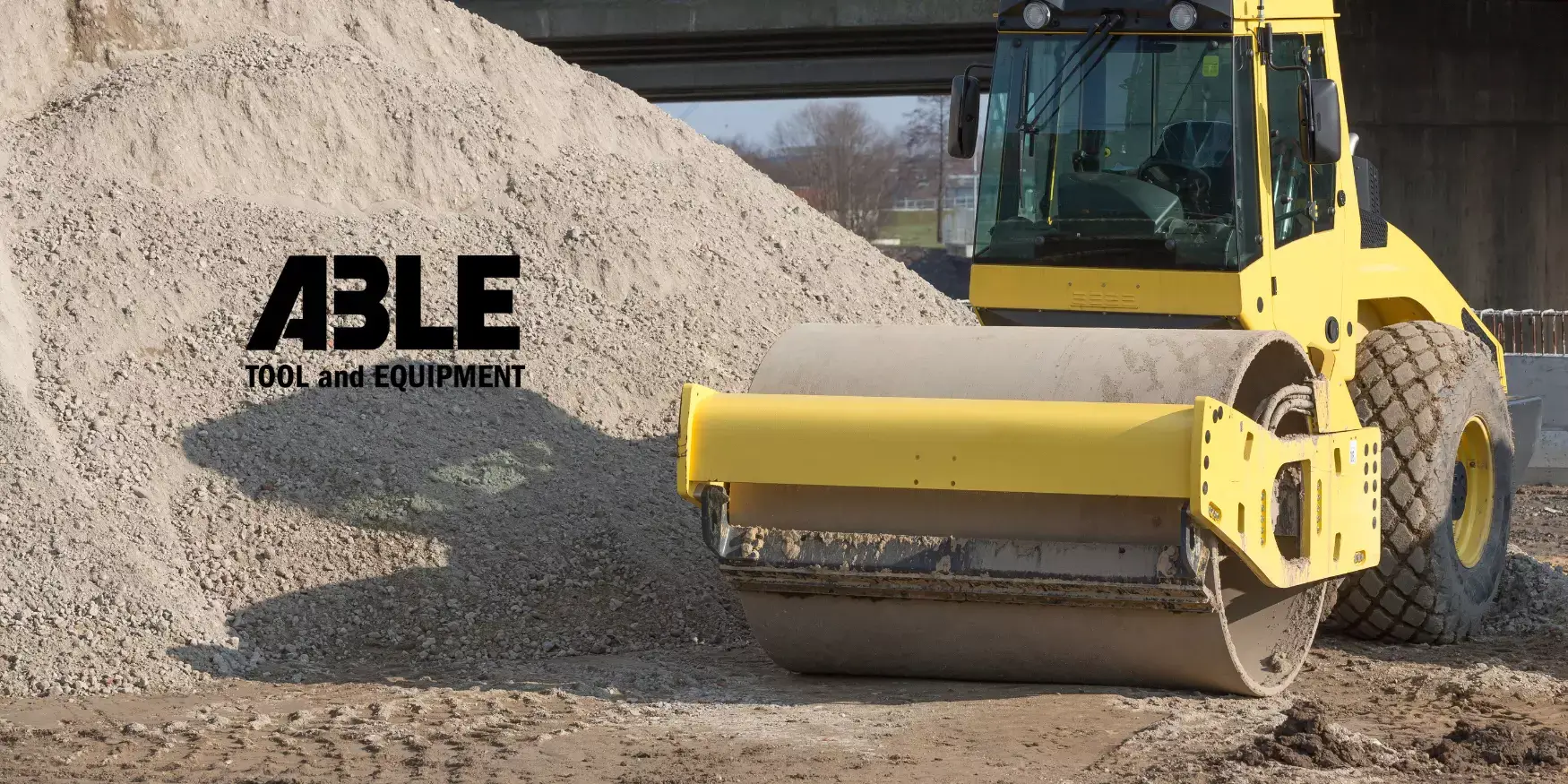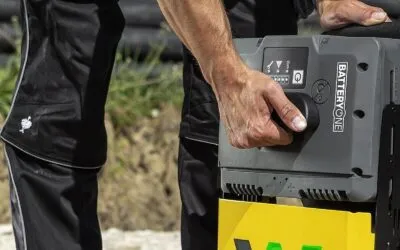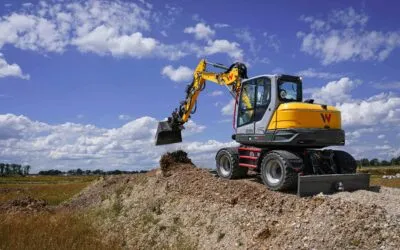Updated November 25, 2025
Compactors are among the most recognized machinery tools in the construction industry. These powerful machines excel at compacting asphalt, sand, gravel, and all types of granular materials or soils, making them indispensable for modern construction projects.
What Is Compaction and Why Does It Matter?
What is compaction? Compaction is the process of mechanically increasing soil density by removing air voids between soil particles. A compactor is a construction site machine specifically designed to compress layers of materials to reduce their size and increase stability. This equipment is primarily used in site work, paving, landscaping, and heavy/highway construction projects throughout Massachusetts and Connecticut.
At Able Tool, we offer the best brands of reliable compactors distinguished by their exceptional power, high durability, and easy maintenance. Are you tired of unreliable machinery and equipment slowing down your construction projects? Look no further than Able Tool for all your compaction equipment needs.
Types of Compactors: Understanding Your Options
The construction industry relies on various types of compactors to handle different materials and project requirements. Understanding these compaction equipment types helps you select the right machine for your specific application.
Asphalt Rollers
Road rollers use the weight of the machine to compress surfaces effectively. These are ideal for asphalt paving and road construction projects. Able Tool & Equipment carries a comprehensive range of Wacker Neuson asphalt rollers, including the RD45 with its 54.3-inch drum width and powerful 4-cylinder Kubota diesel engine. For larger commercial projects, the RD40 offers similar diesel power with a 51.2-inch drum width. Smaller applications benefit from the RD12A, featuring a 35.4-inch drum and air-cooled Honda gasoline engine for easy maneuverability on residential driveways and parking lots.
Dirt Rollers and Trench Rollers
These versatile machines, also known as multipurpose compactors, work exceptionally well in cohesive soil types. Compaction in construction often requires specialized equipment like dirt rollers to achieve optimal results. Able Tool & Equipment offers Wacker Neuson single drum soil compactors in multiple sizes. The RC110 is their largest model with an impressive 84.25-inch drum width and Deutz diesel engine, perfect for highway and large-scale earthwork projects. For mid-size applications, the RC70 features a 66.1-inch drum with Kubota diesel power. The compact RTxSC3 trench roller weighs just 3,235 pounds and fits in tight spaces with its 32-inch width, making it ideal for utility trenches and confined work areas. Wacker Neuson claims the RTxSC3 “offers proven compaction results with safer operation.”
Battery-Powered Compaction Equipment
Battery-powered equipment represents the future of construction machinery. These environmentally friendly options produce less noise, reduce emissions, and save operational costs. Able Tool & Equipment offers Wacker Neuson’s innovative battery-powered lineup, including the AP2560e Battery Vibratory Plate that runs a full working day on one charge. The emission-free operation protects operators and opens new possibilities for indoor applications and emission-regulated urban areas. Their battery rammer models, like the AS60e and AS50e, deliver powerful compaction without fumes or excessive noise. These machines use modular battery systems that interchange between different equipment types, providing flexibility and cost savings across your fleet.
Rammers and Pogos
Also known as jumping jacks, rammers deliver high-impact compaction force for cohesive soils and confined spaces. Able Tool & Equipment carries both Wacker Neuson and Weber rammer models. The Wacker Neuson BS50-4 is a 4-stroke rammer delivering 3,597 pounds of impact force with its 11 x 13.4-inch ramming shoe. Weber’s SRV 660 provides even more power at 4,699 pounds of impact force, ideal for deeper lifts and challenging soil conditions. For extremely narrow trenches and tight work areas, the Weber SRV 300 narrow rammer weighs only 71 pounds with a compact 5.5-inch shoe width. Able Tool also stocks pneumatic tampers from Chicago Pneumatic, including the CP 003 and CP 004 models for specialized applications.
Plate Compactors
Plate compactors are versatile machines suitable for granular soils and asphalt work. Able Tool & Equipment maintains an extensive inventory of Weber plate compactors in both forward and reversible configurations. The Weber CR 5 reversible plate is a heavy-duty machine weighing 617 pounds with 10,150 pounds of centrifugal force and a 22-inch working width (expandable to 28 inches). For lighter applications, the CF 1 forward plate weighs just 132 pounds with a 14-inch working width, perfect for walkways and small repairs. Mid-range options like the CR 3 and CR 6 provide 7,868 and 12,364 pounds of centrifugal force respectively, powered by reliable Honda engines. Wacker Neuson vibratory plates round out the selection with models like the WP1540A for single-direction compaction needs.
Bonus: Watch the Able Tool team show off the Wacker Neuson Vibratory Compaction Plate!
Smooth Drum Compactors
Smooth drum compactors work efficiently to compact subsoils and asphalt material. They feature a roller steel cylinder that oscillates and vibrates to eliminate gaps between asphalt and soil components, ensuring a solid, stable surface.
Understanding Soil Compaction Tools and Their Applications
Soil compaction tools vary based on the material being compacted and the project requirements. Different machines excel in various working spaces and with specific standard materials in the soil.
Granular Soils
For sand, gravel, and coarse particulate soils, vibratory equipment works best. The vibration causes soil particles to move into a more stable formation. Their advantage is that one operator can manage them effectively in small spaces or areas with many obstacles.
Cohesive Soils
Road rollers are better suited for cohesive soils such as clay or for compacting asphalt that forms the pavement base. They excel in larger areas with adequate space for movement. As self-propelled vehicles, they can move faster—a valuable asset for construction on highways, streets, and expansive areas. The weight of these rollers can reach up to twelve tons.
Types of Soil Compaction Equipment for Different Project Needs
Selecting the appropriate types of soil compaction equipment is critical for project success. The execution of works on roads or highways requires clearing, filling, and excavation processes to adapt the natural terrain levels to those required for the construction project.
The primary function of a compactor is to produce soil densification through its own weight and a dynamic load using an eccentric mass that rotates around the roller’s axis, creating vibration. This vibration is what makes modern compaction equipment so effective.
Why Do You Need Compactors?
After newly placed soil is leveled, it must be compacted to provide the necessary capacity to support loads generated by the weight of the road structure itself and the traffic that will use it. Proper compaction in construction prevents future disruptions and ensures long-term structural integrity.
Although it may seem straightforward, soil compaction can be one of the most challenging elements of any construction project. Manufacturers offer options on their compaction equipment that allow operators to adjust the machine’s vibration, frequency, and amplitude to meet job-site specifications.
Tool for Compacting Dirt: Best Practices and Selection
Choosing the right tool for compacting dirt depends on several factors:
Material Type
Different soils require different compaction approaches. Granular materials respond well to vibratory equipment, while cohesive soils benefit from static weight and kneading action.
Project Scale
Small, confined spaces require compact, maneuverable equipment like plate compactors or rammers. Large-scale highway projects benefit from road rollers and large smooth drum compactors.
Lift Thickness
The depth of material being compacted influences equipment selection. Thinner lifts work well with plate compactors, while thicker lifts may require heavier rollers.
Production Requirements
The operator should choose a compactor sized to complete production requirements efficiently. The best compaction performance is achieved by experimenting with variables the operator can control, such as frequency, amplitude, and rolling speed.
Optimizing Compaction Performance
There is no universal formula for adjusting a compactor’s operating parameters relative to the material being compacted. Sometimes trial and error proves most effective. However, operators should ideally identify job site characteristics to use the compactor that best suits their needs.
Performance should be analyzed continuously, with adjustments made as necessary. Modern compaction equipment provides real-time feedback through onboard monitoring systems, helping operators achieve optimal results.
The Role of Compaction Equipment in Modern Construction
Compactors play a crucial role in the construction industry. Their function is to apply pressure to soil to reduce air pockets and enable better handling of heavy structure weight. Soil compaction helps prevent future disruptions, settlement issues, and structural failures.
This heavy machinery is also implemented for compacting cohesive materials such as clay, which requires different techniques than granular soils. The versatility of modern compaction equipment allows contractors to handle diverse project requirements with confidence.
Compaction Equipment Types: Making the Right Choice
When evaluating compaction equipment types, consider these key factors:
Operational Environment
Will you work in confined spaces, open areas, or both? Different environments demand different equipment capabilities.
Material Characteristics
Understanding soil type, moisture content, and gradation helps you select appropriate compaction methods and equipment.
Accessibility
Consider how equipment will reach the work area. Some projects require compact machines that can navigate through narrow passages.
Power Source
Traditional fuel-powered machines offer high power output, while battery-powered options provide environmental benefits and reduced operating costs.
Frequently Asked Questions About Compaction Equipment
What is compaction and why is it important in construction?
Compaction is the process of mechanically increasing soil density by removing air voids between soil particles. It’s crucial in construction because properly compacted soil provides the necessary support for roads, buildings, and other structures. Without adequate compaction, surfaces can settle unevenly over time, leading to cracks, structural damage, and costly repairs. Compaction ensures long-term stability and durability for any construction project.
What are the different types of compactors and which one do I need?
The main types of compactors include asphalt rollers for paving projects, plate compactors for granular soils, rammers for cohesive soils in tight spaces, and trench rollers for utility work. The right compactor depends on your project’s specific needs, including the soil type, project size, and working space. For granular materials like sand and gravel, vibratory plate compactors work best. For clay and cohesive soils, rammers or smooth drum rollers are more effective. Able Tool’s team can help you select the perfect equipment for your Massachusetts or Connecticut project.
What’s the difference between forward and reversible plate compactors?
Forward plate compactors move in one direction only and are ideal for smaller jobs like walkways, driveways, and landscaping projects. Reversible plate compactors can move both forward and backward, making them more maneuverable and efficient for larger areas. Reversible plates also generate higher compaction force, making them better suited for thicker lifts and more demanding applications like road base preparation and commercial paving projects.
Are battery-powered compactors as effective as gas-powered models?
Yes, modern battery-powered compactors deliver comparable performance to traditional gas-powered models while offering several advantages. They produce zero emissions, making them ideal for indoor work and urban areas with strict emission regulations. Battery compactors are also quieter, reducing noise pollution on job sites. With advances in lithium-ion battery technology, models like the Wacker Neuson AP2560e can run a full working day on a single charge, providing the power you need without the fumes or maintenance requirements of gas engines.
Able Tool & Equipment: Your Partner for Compaction Solutions in Massachusetts and Connecticut
If you need advice on selecting the type of heavy equipment for soil compaction, contact the team at Able Tool, a company specializing in equipment rental and sale in Massachusetts and Connecticut.
We understand the importance of having the right tools for the job. That’s why we offer a wide selection of construction machinery and equipment designed to meet your specific needs. From hand tools to heavy equipment, we have everything you need to tackle your next project with confidence.
If you need to buy or rent compactors, Able Tool and Equipment provides the best options for your requirements. Our inventory includes every major type of compactor needed for modern construction projects, ensuring you have access to the right equipment when you need it.
Contact Able Tool & Equipment for Expert Guidance
Whether you’re working on highway construction, site preparation, landscaping, or any project requiring soil compaction, Able Tool has the expertise and equipment inventory to support your success.
If you have any questions about this equipment, do not hesitate to contact us. We’ll be glad to answer your questions and help you select the perfect compaction solution for your project in Massachusetts or Connecticut.
Contact us today to learn more about our services and discover how our comprehensive selection of compactors can help you complete your construction projects efficiently and effectively.
![LOGO-white]](https://abletoolnet03d53.zapwp.com/q:i/r:0/wp:1/w:1/u:https://abletool.net/wp-content/uploads/2024/12/LOGO-white.png)



